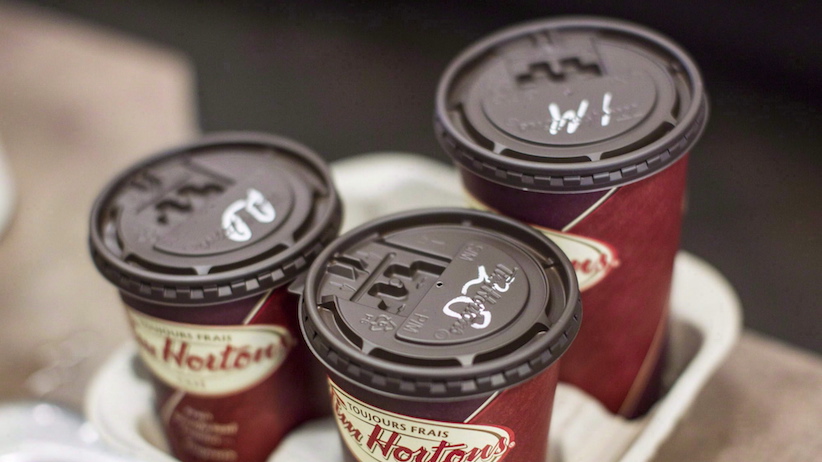Can Tim Hortons thrive without its Canadian crutch?
Tim Hortons is about to enter the coffee-saturated United Kingdom. Will Timbits and leaky lids win over the Brits?

Cups of coffee sit on a counter in a Tim Hortons outlet in Oakville, Ont., on September 16, 2013. Tim Hortons is pouring a new cup of joe starting today as it looks to attract coffee connoisseurs from some of its competitors. THE CANADIAN PRESS/Chris Young
Share

It takes a squad of Tim Hortons employees in aprons and visors, bustling about the Canadian High Commission in London serving day-old Timbits to slightly baffled Brits, to make one realize just how weirdly and deeply the Tim Hortons brand has fused itself to Canada. Even the trained, media-friendly employees can’t explain it.
“Well … I mean … we’re the filter coffee nation!” says one young Canadian server gamely, before asking, as if the two choices represented the apex of cosmopolitan coffee culture, whether a guest would prefer Original or Dark Roast.
The international media had been invited to Canada House in order to celebrate the launch of Tim Hortons in the U.K.—or at least in Glasgow, where its Argyle Street branch will be the first step in an eventual rollout to other British cities, though not London. Guests had been enjoined to “enjoy some renowned Canadian hospitality”, which is a bit like asking someone to appreciate Britain’s famous sidewalks.
Instead, seeing Timbits glistening not 200 feet from Nelson’s Column, in some of the most prime real estate on Earth, strips them of their near-mythic status as comfort food to a nation. They’re just little balls of sweetened dough. Aren’t they?
“I love Tim Hortons!” says Sandra Oghagbon, who visited Canada recently, found the chain inescapable, and embraced the inevitable. “I love the French Vanilla—and the hot chocolate. Those two drinks?” She kisses her fingertips. Adam Dewar, a Scotsman, is less impressed. “I really don’t see how this is going to catch on,” he says.
“Which is your favourite?” asks Janice Charette, the High Commissioner of Canada to the United Kingdom, who after agreeing on sour cream offers her version of the Canadian (and, courtesy a massive continuing advertising spend, Tim Horton’s) ur-story. “I’m a hockey mom,” she says, “so for me that meant a lot of mornings in Ottawa piling my children into the minivan and then shivering in the rink with a cup of Tim’s.”
She’s obviously not alone in this. It is hard to overstate Tim Hortons dominance within the Canadian quick-service restaurant segment. The company claims to pour eight out of every 10 cups of coffee sold in Canada, and says roughly 5.3 million people—15 per cent of the entire population—visits a Tim Hortons every day.
This territory has been seized using two weapons: the Timbit, the chain’s only significant food retail innovation; and a steadfast refusal to embrace coffee fads, its new Latte notwithstanding. (The chain is at pains to assure those for whom complicated coffee-ordering has become a byword for urban snobbery that the new Tim’s version is simplicity itself: “Tim Hortons Guests need only say “latte” to receive the new made-to-order specialty beverage that’s one size, one price and the perfect balance of just two simple ingredients—freshly ground premium 100% Arabica espresso beans and freshly steamed Canadian milk”.)
Having conquered Canada, and secured forward positions in the U.S. and the Middle East, Tim’s next target is Britain. But how will it position itself in a market saturated with competitors? For donuts, there are Dunkin’ Donuts and Krispy Kreme; Pret a Manger or Greggs serve fresh, inexpensive sandwiches; and there are more coffee shops in Britain than pubs. In the golden age of the espresso machine, will Brits reject a pre-Starbucks anachronism that won’t serve them a flat white? Above all, will a brand so inextricably linked with a particular national identity (and sport) translate, in any meaningful way, to Britain, where “Canada” generally signifies bears and Bieber, and Lord Stanley is thought of as an unremarkable Colonial Secretary, when he is thought of at all?
“Being associated with Canada at this particular moment in history is no bad thing,” says Neil Littler, chief marketing officer of Tim Hortons U.K. & Ireland, in an allusion to Justin Trudeau’s popularity. “But we won’t be sticking maple leaves on everything.” Nor will there be an advertising campaign glorifying Charette-style hockey moms or the Canadian immigrant experience.
Instead, Littler says the chain is betting that it can hold its own on the British high street by making its food fresh to order. He praises the reaction so far on social media, where the company is concentrating its marketing pounds; though it’s hard not to imagine that most of the few thousand Facebook likes for Tim Hortons U.K. & Ireland have come from the homesick. Gurprit Dhaliwal, chief operation officer, stresses that they’re going to test the waters in Scotland first, and that success can be modest. How will the company sell itself? “When you find out, let me know!”
It takes Charette to point out the other irony here—of the Canadian embassy hosting a launch for an American company. (Tim Horton’s is owned by a U.S. firm, Restaurant Brands International, which also owns Burger King.) Charette notes that the chain, regardless of ownership, is a major employer in Canada and that the High Commission also aims to promote Canadian culture in Britain. “Tim Hortons means a lot to Canadians,” she says.
What it will mean to Brits—a people working hard to overcome their longstanding reputation as murderers of food—is the real question. The hope, if there is any, might lie with the very people who have helped make coffee so complicated in the first place: hipsters. Tim Hortons is the ultimate normcore restaurant, about as unpretentious as double denim. It could benefit from a backlash against espresso, should such a momentous event occur. Otherwise, without the crutch of Canadian identity to lean on, Tim Hortons in the U.K. will stand or fall on the Timbit. That’s a lot of responsibility to put on something meant to represent nothing.